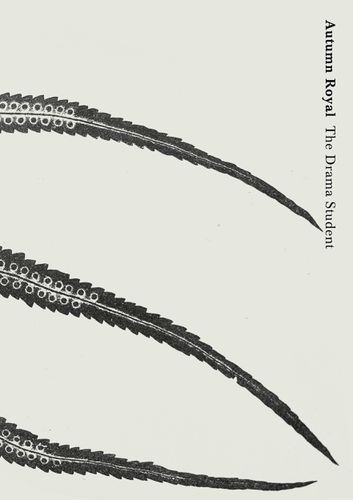Readings Newsletter
Become a Readings Member to make your shopping experience even easier.
Sign in or sign up for free!
You’re not far away from qualifying for FREE standard shipping within Australia
You’ve qualified for FREE standard shipping within Australia
The cart is loading…






As its title suggests, the poems in Autumn Royal’s The Drama Student explore theatrical responses to life. And in particular, the staging of the emotional life. The subject, a student of experience, and a writer with an uncertain future, feels her vulnerability and dependency. Grief is paramount among her emotional responses, provoked by hauntings of violence, the death of loved ones, the failure of relationships, the disappointment of her aspirations. The great fear: ‘I am threatened / with an exceptional ability and no means / of expression.’ The theatre provides those means, the expressive gestures, the subversion of typecast roles, the transformation of domestic objects into props for the performance of self, and the richness of language. Royal’s use of the elegiac form offers no answers, only the hope of tearing open conventional understandings of loss and insecurity, as it invokes a tradition of women poets and thinkers.
$9.00 standard shipping within Australia
FREE standard shipping within Australia for orders over $100.00
Express & International shipping calculated at checkout
As its title suggests, the poems in Autumn Royal’s The Drama Student explore theatrical responses to life. And in particular, the staging of the emotional life. The subject, a student of experience, and a writer with an uncertain future, feels her vulnerability and dependency. Grief is paramount among her emotional responses, provoked by hauntings of violence, the death of loved ones, the failure of relationships, the disappointment of her aspirations. The great fear: ‘I am threatened / with an exceptional ability and no means / of expression.’ The theatre provides those means, the expressive gestures, the subversion of typecast roles, the transformation of domestic objects into props for the performance of self, and the richness of language. Royal’s use of the elegiac form offers no answers, only the hope of tearing open conventional understandings of loss and insecurity, as it invokes a tradition of women poets and thinkers.
The Drama Student by Autumn Royal weaves a peculiar sense of urgency, the staging of an emotional life both episodic and dramatic. Like when you tug on a loose thread and all the other strands at once become tangled. As the title suggests, the poems explore theatrical responses to life, and with this an unresolvable tension.
The actress-protagonist at the centre of the frame is burdened by memory, and the snarl of a wistful nostalgia – the simultaneity of learning and thinking, and how quickly everything can disappear. The great fear: ‘I am threatened / with an exceptional ability and no means / of expression.’ The theatre provides those means, the expressive gestures, the subversion of typecast roles, the transformation of domestic objects into props for the performance of self, and the richness of language.
In the author notes Royal writes: ‘I needed to ascertain exactly why love and loss generate such an ecstatic awareness, and the uncanny sensation of being both inside and outside of the body.’ It is part memory, part imagination. In ‘Versing about no body’, Royal laments, ‘Do I cover up my tracks or expose the wounds? I slow my thinking with inhalations – my stomach rising as my hands scroll down to stroke my hip bones – evoking the ceremonious tones of moving away from this frame. Since there is no body – judgement is nothing.’ Potent and elegiac, however, the lines remain direct, even in a moment of deflection, and fall softly with curious and content introspection. There’s room for not-knowing, for travelling thoughts. The adage ‘not all who wander are lost’ could find meaningful application in The Drama Student, which will undoubtedly inspire readers, or students of the craft, who may or may not consider their own memory as it disorients and transports.
Rediscover classic poetry or find a new favourite from modern poets like Rupi Kaur, Maxine Beneba Clarke and Padraig O Tuama.
Read beloved and emerging Australian poets like Judith Bishop, Jazz Money and Nam Le.